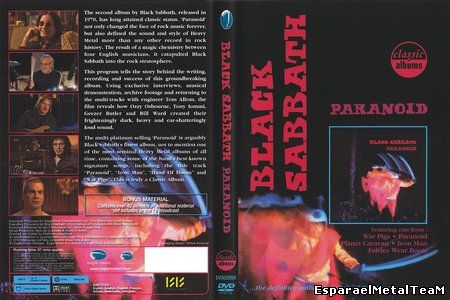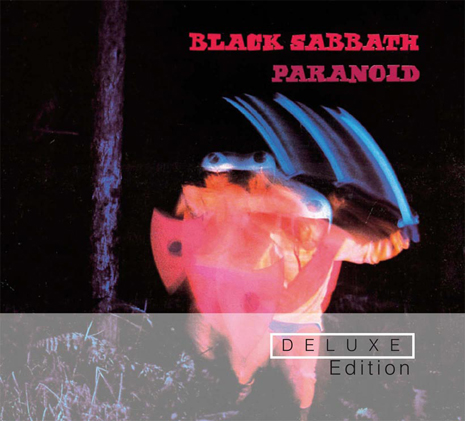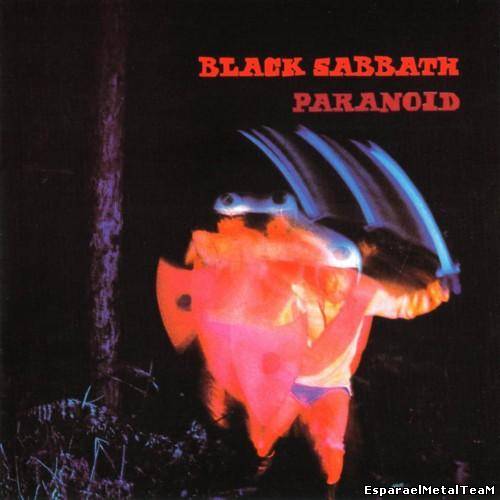Classic Albums: Black Sabbath - Paranoid (2010)  Video: NTSC, MPEG-2 at 9 800 Kbps, 720 x 480 (1.778) at 29.970 fps | Audio: AC-3 2 channels at 192 Kbps, 48.0 KHz
Video: NTSC, MPEG-2 at 9 800 Kbps, 720 x 480 (1.778) at 29.970 fps | Audio: AC-3 2 channels at 192 Kbps, 48.0 KHz
Genre: Rock, Metal | Label: Eagle Rock | Copy: Untouched | Release Date: 28 Jun 2010 | Runtime: 97 min. | 4,25 GB (DVD5)
Subtitles: Italian, English, German, Spanish, French, Dutch, Portuguese Black Sabbath have been so influential in the development of heavy metal rock music as
to be a defining force in the style. The group took the blues-rock
sound of late-'60s acts like Cream, Blue Cheer, and Vanilla Fudge to its
logical conclusion, slowing the tempo, accentuating the bass, and
emphasizing screaming guitar solos and howled vocals full of lyrics
expressing mental anguish and macabre fantasies. If their predecessors
clearly came out of an electrified blues tradition, Black Sabbath took
that tradition in a new direction, and in so doing helped give birth to a
musical style that continued to attract millions of fans decades later.
The group was formed by four teenage friends from Aston, near
Birmingham, England: Anthony "Tony" Iommi (b. Feb 19, 1948), guitar;
William "Bill" Ward (b. May 5, 1948), drums; John "Ozzy" Osbourne (b.
December 3, 1948), vocals; and Terence "Geezer" Butler (b. July 17,
1949), bass. They originally called their jazz-blues band Polka Tulk,
later renaming themselves Earth, and they played extensively in Europe.
In early 1969, they decided to change their name again when they found
that they were being mistaken for another group called Earth. Butler had
written a song that took its title from a film directed by Mario Bava,
Black Sabbath, and the group adopted it as their name as well. As they
attracted attention for their live performances, record labels showed
interest, and they were signed to Philips Records in 1969. In January
1970, the Philips subsidiary Fontana released their debut single, "Evil
Woman (Don't Play Your Games with Me)," a cover of a song that had just
become a U.S. hit for Crow; it did not chart. The following month, a
different Philips subsidiary, Vertigo, released Black Sabbath's
self-titled debut album, which reached the U.K. Top Ten. Though it was a
less immediate success in the U.S. where the band's recordings were
licensed to Warner Bros. Records and appeared in May 1970 the LP broke
into the American charts in August, reaching the Top 40, remaining in
the charts over a year, and selling a million copies. Appearing at the
start of the '70s, Black Sabbath embodied the Balkanization of popular
music that followed the relatively homogenous second half of the 1960s.
As exemplified by its most popular act, the Beatles, the '60s suggested
that many different aspects of popular music could be integrated into an
eclectic style with a broad appeal. the Beatles were as likely to
perform an acoustic ballad as a hard rocker or R&B-influenced tune.
At the start of the '70s, however, those styles began to become more
discrete for new artists, with soft rockers like James Taylor and the
Carpenters emerging to play only ballad material, and hard rockers like
Led Zeppelin and Grand Funk Railroad taking a radically different
course, while R&B music turned increasingly militant. The first wave
of rock critics, which had come into existence with the Beatles, was
dismayed with this development, and the new acts tended to be poorly
reviewed despite their popularity. Black Sabbath, which took an even
more extreme tack than the still blues- and folk-based Led Zeppelin, was
lambasted by critics (and though they eventually made their peace with
Zeppelin, they never did with Sabbath). But the band had discovered a
new audience eager for its uncompromising approach.
Black Sabbath quickly followed their debut album with a second album,
Paranoid, in September 1970. The title track, released as a single in
advance of the LP, hit the Top Five in the U.K., and the album went to
number one there. In the U.S., where the first album had just begun to
sell, Paranoid was held up for release until January 1971, again
preceded by the title track, which made the singles charts in November;
the album broke into the Top Ten in March 1971 and remained in the
charts over a year, eventually selling over four million copies, by far
the band's best-selling effort. (Its sales were stimulated by the
belated release of one of its tracks, "Iron Man," as a U.S. single in
early 1972; the 45 got almost halfway up the charts, the band's best
showing for an American single.)
Master of Reality, the third album, followed in August 1971, reaching
the Top Ten on both sides of the Atlantic and selling over a million
copies. Black Sabbath, Vol. 4 (September 1972) was another Top Ten
million-seller. For Sabbath Bloody Sabbath (November 1973), the band
brought in Yes keyboard player Rick Wakeman on one track, signaling a
slight change in musical direction; it was Black Sabbath's fifth
straight Top Ten hit and million-seller. In 1974, the group went through
managerial disputes that idled them for an extended period. When they
returned to action in July 1975 with their sixth album, Sabotage, they
were welcomed back at home, but in the U.S. the musical climate had
changed, making things more difficult for an album-oriented band with a
heavy style, and though the LP reached the Top 20, it did not match
previous sales levels. Black Sabbath's record labels quickly responded
with a million-selling double-LP compilation, We Sold Our Soul for Rock
'n' Roll (December 1975), and the band contemplated a more pronounced
change of musical style. This brought about disagreement, with guitarist
Iommi wanting to add elements to the sound, including horns, and singer
Osbourne resisting any variation in the formula. Technical Ecstasy
(October 1976), which adopted some of Iommi's innovations, was another
good but not great seller, and Osbourne's frustration eventually led to
his quitting the band in November 1977. He was replaced for some live
dates by former Savoy Brown singer Dave Walker, then returned in January
1978. Black Sabbath recorded their eighth album, Never Say Die!
(September 1978), the title track becoming a U.K. Top 40 hit before the
LP's release and "Hard Road" making the Top 40 afterwards. But the
singles did not improve the album's commercial success, which was again
modest, and Osbourne left Black Sabbath for a solo career, replaced in
June 1979 by former Rainbow singer Ronnie James Dio (b. July 10, 1949,
d. May 16, 2010). (Also during this period, keyboardist Geoff Nichols
became a regular part of the band's performing and recording efforts,
though he was not officially considered a bandmember until later.) The
new lineup took its time getting into the recording studio, not
releasing its first effort until April 1980 with Heaven and Hell. The
result was a commercial resurgence. In the U.S., the album was a
million-seller; in Britain, it was a Top Ten hit that threw off two
chart singles, "Neon Knights" and "Die Young." (At the same time, the
band's former British record label issued a five-year old concert album,
Black Sabbath Live at Last, that was quickly withdrawn, though not
before making the U.K. Top Five, and reissued "Paranoid" as a single,
getting it into the Top 20.) Meanwhile, drummer Bill Ward left Black
Sabbath due to ill health and was replaced by Vinny Appice. The lineup
of Iommi, Butler, Dio, and Appice then recorded Mob Rules (November
1981), which was almost as successful as its predecessor: In the U.S.,
it went gold, and in the U.K. it reached the Top 20 and spawned two
chart singles, the title track and "Turn Up the Night." Next on the
schedule was a concert album, but Iommi and Dio clashed over the mixing
of it, and by the time Live Evil appeared in January 1983, Dio had left
Black Sabbath, taking Appice with him. The group reorganized by
persuading original drummer Bill Ward to return and, in a move that
surprised heavy metal fans, recruiting Ian Gillan (b. August 19, 1945),
former lead singer of Black Sabbath rivals Deep Purple. This lineup
Iommi, Butler, Ward, and Gillan recorded Born Again, released in
September 1983. Black Sabbath hit the road prior to the album's release,
with drummer Bev Bevan (b. November 25, 1946) substituting for Ward,
who would return to the band in the spring of 1984. The album was a Top
Five hit in the U.K. but only made the Top 40 in the U.S. Gillan
remained with Black Sabbath until March 1984, when he joined a Deep
Purple reunion and was replaced by singer Dave Donato, who was in the
band until October without being featured on any of its recordings.
Black Sabbath reunited with Ozzy Osbourne for its set at the Live Aid
concert on July 13, 1985, but soon after the performance, bassist Geezer
Butler left the band, and with that the group became guitarist Tony
Iommi's vehicle, a fact emphasized by the next album, Seventh Star,
released in January 1986 and credited to "Black Sabbath featuring Tony
Iommi." On this release, the lineup was Iommi (guitar); another former
Deep Purple singer, Glenn Hughes (b. August 21, 1952) (vocals); Dave
Spitz (bass); Geoff Nichols (keyboards); and Eric Singer (drums). The
album was a modest commercial success, but the new band began to
fragment immediately, with Hughes replaced by singer Ray Gillen for the
promotional tour in March 1986.
With Black Sabbath now consisting of Iommi and his employees, personnel
changes were rapid. The Eternal Idol (November 1987), which failed to
crack the U.K. Top 50 or the U.S. Top 100, featured a returning Bev
Bevan, bassist Bob Daisley, and singer Tony Martin. Bevan and Daisley
didn't stay long, and there were several replacements in the bass and
drum positions over the next couple of years. Headless Cross (April
1989), the band's first album for I.R.S. Records, found veteran drummer
Cozy Powell (b. December 29, 1947, d. April 5, 1998) and bassist
Laurence Cottle joining Iommi and Martin. It marked a slight uptick in
Black Sabbath's fortunes at home, with the title song managing a week in
the singles charts. Shortly after its release, Cottle was replaced by
bassist Neil Murray. With Geoff Nichols back on keyboards, this lineup
made TYR (August 1990), which charted in the Top 40 in the U.K. but
became Black Sabbath's first regular album to miss the U.S. charts.
Iommi was able to reunite the 1979-1983 lineup of the band himself,
Geezer Butler, Ronnie James Dio, and Vinny Appice for Dehumanizer (June
1992), which brought Black Sabbath back into the American Top 50 for the
first time in nine years, while in the U.K. the album spawned "TV
Crimes," their first Top 40 hit in a decade. And on November 15, 1992,
Iommi, Butler, and Appice backed Ozzy Osbourne as part of what was
billed as the singer's final live appearance. Shortly after, it was
announced that Osbourne would be rejoining Black Sabbath.
That didn't happen yet. Instead, Dio and Appice left again, and Iommi
replaced them by bringing back Tony Martin and adding drummer Bob
Rondinelli. Cross Purposes (February 1994) was a modest seller, and,
with Iommi apparently maintaining a Rolodex of all former members from
which to pick and choose, the next album, Forbidden (June 1995),
featured returning musicians Cozy Powell, Geoff Nichols, and Neil
Murray, along with Iommi and Martin. The disc spent only one week in the
British charts, suggesting that Black Sabbath finally had exhausted
their commercial appeal, at least as a record seller. With that, the
group followed the lead of the Eagles and Fleetwood Mac, putting the
most popular lineup of the band back together for a live album with a
couple of new studio tracks on it. Recorded in the band's hometown of
Birmingham, England, in December 1997, the two-CD set Reunion featuring
all four of Black Sabbath's original members, Iommi, Osbourne, Butler,
and Ward was released in October 1998. It charted only briefly in the
U.K., but in the U.S. it just missed reaching the Top Ten and went
platinum. The track "Iron Man" won Black Sabbath their first Grammy
Award for Best Metal Performance. The band toured through the end of
1999, concluding their reunion tour on December 22, 1999, back in
Birmingham.
In February 2001, Black Sabbath announced that they would reunite once
again to headline the sixth edition of Ozzfest, Osbourne's summer
concert festival, playing 29 cities in the U.S. beginning in June. More
surprisingly, the group also announced their intention to record a
studio album of all-new material, the original lineup's first since
1978. By the end of the year, a failed recording session with producer
Rick Rubin proved what an unreasonable idea this was, and the band laid
dormant while Osbourne enjoyed scoring a hit TV series the following
spring. The band split once more. Osbourne went on recording and touring
on his own, while Iommi and Butler reunited with Vinny Appice and
Ronnie James Dio to form Heaven & Hell. The band recorded a live
album at Radio City Music Hall, performing Sabbath material from the
Heaven and Hell and Mob Rules albums in 2007, before releasing a studio
effort entitled Devil You Know in 2009. Dio was diagnosed with cancer
and passed away in 2010 of that year.
In late 2011, all four of Black Sabbath's original members announced yet
another reunion; this time they claimed the band would record new
material as well as tour. Iommi was diagnosed with early-stage lymphoma
early in 2012, however, and it was spring before Osbourne, Iommi, and
Butler took to the stage on May 19th at O2 Academy in Birmingham,
England for their first show together since 2005. At the end of the
summer it was announced that the band was indeed working on material for
a new album. The long-awaited 13 surfaced in the early summer of 2013;
however, drummer Bill Ward was absent from the recording process
completely. In his stead was Rage Against the Machine drummer Brad Wilk,
who provided drums for the album as well as its accompanying live
dates. Some evidence of the ensuing tour was documented with the live
album Gathered in Their Masses, which arrived before the end of the
year.
Tracklist: 01. Intro [2:32]
02. Early Sabbath [9:02]
03. War Pigs [6:56]
04. Iron Man [6:32]
05. Planet Caravan [6:44]
06. Electric Funeral [4:06]
07. Hand Of Doom [5:20]
08. Fairies Wear Boots [4:56]
09. Paranoid [8:31]
Extras: - Musical Influences
- 1st US Tour
- No Returns
- Play In A Day The Iommi Way
- Did Give Up The Day Job
- Paranoid
- Geezer's Bargain Bassment
- Rat Salad
- Bill's Traps
- Planet Caravan
- The Backing Track Tapes
Features: - Direct Scene Access
- Interactive Menu




 Disponible sólo a los usuarios
Disponible sólo a los usuarios 














 FANTASTIC SINGER!!!
FANTASTIC SINGER!!!

 NO A LA LEY LASSALLE
NO A LA LEY LASSALLE





